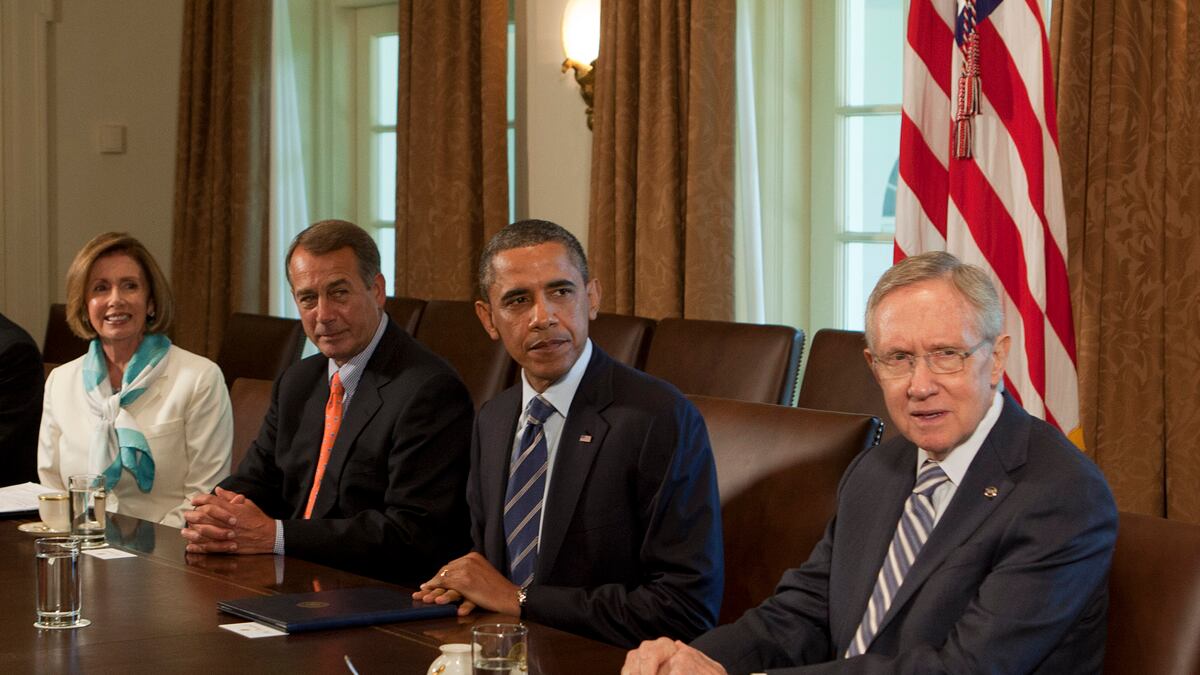President Obama used words like “frank” and “constructive” to describe his 90-minute budget session with Republican and Democratic leaders on Thursday, adding that “the two parties are still far apart on a wide range of issues.”
That doesn’t sound very optimistic for what one official described as a “take the temperature” session, not with a looming Aug. 2 deadline to raise the debt ceiling before the government defaults on its debt.
But Republicans are suddenly sounding more positive about an elusive agreement. A GOP leadership source said House Speaker John Boehner told his caucus that the odds were “maybe 50-50” of reaching a deal within 48 hours—although the source said it would take longer than that, with the president having called another meeting for Sunday. That is a more upbeat assessment than anyone associated with the talks has voiced publicly so far.
Republicans were greatly encouraged by the administration’s willingness to consider substantial cuts in Medicare and Medicaid, the source said. At the same time, the GOP has signaled a willingness to accept Democratic proposals for certain tax increases—but only, based on the party’s mantra, if offsetting tax reductions are made at the same time.
Still, things could fall apart over the actual details of closing a deal that involves trillions of dollars in reductions. “Everyone acknowledged that pain will be involved politically on all sides,” the president said.
The morning papers contained hints that Obama and Boehner might be moving toward a grand deficit-slashing bargain. One thing is clear, based on the emerging White House spin: Obama is trying to position himself as a budget cutter who will restore the nation’s fiscal sanity.
This would be a remarkable political pivot, given that the president spent the first two years presiding over a huge increase in federal spending, most notably on health care (though he had the unenviable task of digging the country out of the wreckage of a financial collapse.)

Not since Bill Clinton hustled to the center after the Democrats lost Congress in 1994 has a president attempted such a fundamental redefinition of his political identity. But Obama faces a far weaker economy in 2012 than Clinton did when he won reelection.
Unnamed sources even floated a trial balloon to The Washington Post that Obama wants a bigger deficit-reduction package, $4 trillion over 10 years, as opposed to a mere $2 trillion. One official told The Daily Beast that Obama is willing to take a big risk because of the potential payoff, likening it to his decision to send special forces to kill Osama bin Laden.
The Post story said the president “for the first time is offering to tackle the rising cost of Social Security.” No specifics were provided though, and it’s extremely unlikely that such a third-rail issue could be resolved so quickly.
In fact, the Social Security suggestion was news to Democratic leaders, including House Minority Leader Nancy Pelosi, who told her caucus before heading to the White House that she was in the dark about such a concession. It was also a surprise to some Hill Republicans.
But as quickly as the news broke, the White House tried to dial it back, with sources telling The Beast that at most Obama is thinking of long-term adjustments to the retirement program’s cost-of-living formula.
“There is no news in the story that pretended to be news this morning," spokesman Jay Carney told reporters, speculating that whoever leaked the story had ideological motivations. He also danced around the possibility that it came from the White House press office.
Carney swatted down a dozen questions about Social Security discussions, falling back on his unwillingness to disclose what was talked about during Obama’s Cabinet Room meeting. He said Obama had expressed a willingness to consider Social Security changes in his State of the Union address.
Asked about Obama’s comment that a budget deal would inflict pain, Carney offered this diagnosis: “Pain can sometimes be psychological and not physical. And it can be perceived pain.”
As for suggestions in the morning papers that the Republicans are suddenly more open to raising revenue—after many months of a just-say-no stance—that was not the message that Eric Cantor took to the morning shows. “If the president wants to talk loopholes, we need offsetting tax cuts somewhere else. We are not for raising taxes,” the House majority leader told Morning Joe, repeating the standard party line about tax hikes.
The Daily Beast’s Daniel Stone contributed to this report.






